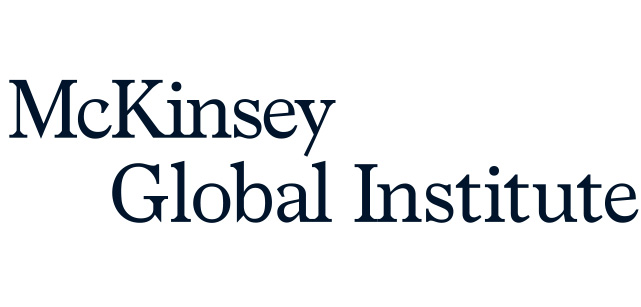McKinsey Global Institute
Member since 2020
The Global Institute is McKinsey’s business and economics research arm. They seek to provide insights on the evolution of the global economy and facts for decision-making on critical management and policy issues.

PROFILE

JONATHAN WOETZEL
MGI Director and Senior Partner, Shanghai

- What does McKinsey Global Institute do, and what is your role there?
The McKinsey Global Institute is McKinsey’s business and economics research arm, where I am a director and co-leader. I am also a senior partner at McKinsey in McKinsey’s Shanghai Office and a leader of McKinsey’s Cities Special Initiative and am responsible for convening McKinsey’s work with city, regional, and national authorities on urban topics.
- What’s one technology, policy, or other innovation working towards affordable housing that you hope to see embraced by cities? What is one city that you’re watching right now for their progress in affordable housing?
I divide my time between Shanghai and Los Angeles. As an Angeleno, I have a passion for the city and have led research and have been involved in initiatives with a range of stakeholders to help address LA’s affordable housing challenges. The findings of this report [link: have relevance for other cities when it comes to reimagining cities and the provision of affordable housing. As we suggest in the report, the prerequisites for affordable housing are threefold: unlock the land (for example by reimagining neighborhood land use), lower the cost of housing primarily through introducing innovative formats and technologies, and find the money, potentially by crowding in private capital. The combination of these efforts in the case of Los Angeles could allow LA to meet its state mandated affordable housing goals by 2028 while reducing its investment by greater than 40%.
- McKinsey Global Institute has explored how the Covid-19 pandemic is impacting the future of work. What are the key trends in the future of work that you think everyone should be following and preparing for?
Before COVID-19, the largest disruptions to work involved new technologies and growing trade links. COVID-19 has, for the first time, elevated the importance of the physical dimension of work. We find that jobs in work arenas with higher levels of physical proximity are likely to see greater transformation after the pandemic, triggering knock-on effects in other work arenas as business models shift in response.
The pandemic pushed companies and consumers to rapidly adopt new behaviors that are likely to stick, changing the trajectory of three groups of trends. Remote work and virtual meetings are likely to continue, albeit less intensely than at the pandemic’s peak. Some companies are already planning to shift to flexible workspaces after positive experiences with remote work during the pandemic, a move that may reduce the overall space they need and bring fewer workers into offices each day. Demand for restaurants and retail in downtown areas and for public transportation may decline as a result.
Another trend to follow and prepare for are the shift to e-commerce, which has grown two to five times faster than before the pandemic in the countries we looked at. At the same time we find that COVID-19 may propel faster adoption of automation and AI, especially in work arenas with high physical proximity.
Because of the pandemic’s impact on low-wage jobs, we now estimate that almost all growth in labor demand will occur in high-wage jobs. Going forward, more than half of displaced low-wage workers may need to shift to occupations in higher wage brackets and requiring different skills to remain employed. The scale of workforce transitions set off by COVID-19’s influence on labor trends increases the urgency for businesses and policymakers to take steps to support additional training and education programs for workers.
- Why do you think our partnership is important, and what topics are you most excited to dive into together?
NewCities plays a critical role in convening, fostering dialogue and disseminating research and best practices, and we’re excited about our ongoing collaboration on a range of topics, including affordable housing, climate risk, the future of work, equity, and smart cities to name a few.
RESERACH
- The net-zero transition: What it would cost, what it could bring On May 4th, 2022 we discussed this report and how policy and private sector innovation can drive progress toward a healthy and sustainable future for all. Rewatch it here.
- McKinsey on Climate Change
- Will productivity and growth return after the COVID-19 crisis?
- The future of work after COVID-19
- Climate risk and response: Physical hazards and socioeconomic impacts
- Affordable housing in Los Angeles:
Delivering more—and doing it faster
COLLABORATIONS ON HOUSING
Room for Improvement
The economic fallout of COVID-19 has pushed two unspoken truths about housing into the spotlight — a majority of individuals are living on a knife-edge, and this is not the result of some personal failing.
“What‘s the matter with California?” was a tête-à-tête between Mckinsey Global Institute‘s Director, Jonathan Woetzel, and Author and Reporter at The New York Times, Conor Dougherty.
Both experts discussed the possible solutions to California’s Housing crisis and at what level the state government should be involved in housing solutions for California, especially in terms of affordability.
COLLABORATIONS ON HEALTH AND CITIES
Health and Cities
A fast-paced panel on technology, collaboration, and social connection with the participation of Jaana Remes, Partner at the McKinsey GLobal Institute.
COLLABORATIONS ON CLIMATE MIGRATION
Climate Migration
Everyone Should Know What’s Coming” was an engaging and educational panel exploring climate risk and the use of data to drive decision making and change within organizations. Spencer Glendon, a Senior Fellow at the Woodwell Climate Research Center & Founder of Probable Futures, opened the session with a presentation that captured current climate trends and the risks we face.